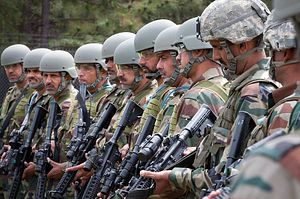In the last week, several soldiers in the Indian army and paramilitary forces have come out on social media to voice their concerns regarding the harsh conditions and poor facilities they are subjected to while performing their duties. All these soldiers also complained about bad behavior by their senior officers. Several claimed that they had to do household chores for their superiors, including cooking, taking care of their children, washing clothes, and even taking their dogs outside.
This was mentioned by one of the jawans (junior soldiers) in his video. He recounted that he tried to complete a “sting operation” on his fellow soldiers, who were subjected to same kind of harassment. Instead, his peers ran away from the camera in order to protect their identity, fearing strict action against them if the matter came out in the open.
One of these soldiers, Tej Bahadur from the Border Security Force (BSF), mentioned the poor quality of food that is being served. In his video, he also noted that he feared the repercussions he might face for publicly voicing his concerns. After the video went viral on social media and was covered by the media, he was shifted to a different unit in BSF.
Bahadur’s was the first video to surface. Afterwards, three more soldiers came out with their own videos.
Another soldier, Yagya Pratap, made a video saying that when he wrote letters to the president and prime minister’s office regarding the exploitation of Indian soldiers by senior officials, his superiors retaliated. In the video, he says that the action taken against him was unjust, considering that he didn’t reveal any secret Army information. Pratap further went on to reveal that he was pressured, abused, and mentally tortured to such an extent that he thought of committing suicide at one stage.
Another soldier, Jeet Singh from Central Reserve Police Force (CRPF), in his video talked about the disparities between the facilities given to soldiers of the Indian Army and CRPF. Army soldiers are given pensions and enjoy quotas for post-military jobs; soldiers from CRPF do not receive either of these benefits. Nor do the CRPF enlistees have access to the Army canteen or good medical services. The soldier said that he wanted soldiers from CRPF to be provided facilities on par with Indian Army soldiers.
Another issue raised by these videos is corruption among army officials. Another soldier, Naik Bhgat, said that out of the menu for food allotted to his unit, only 40 percent reaches them. No one knows what happens to the rest of the menu. He also revealed that jawans are not given a vehicle to drop them off when they go on leave. On the contrary, lieutenants, majors, and senior officers are not only given a car but also a luggage-handler.
All these videos created quite a stir in the media and the public. Once the videos came out, the authorities responded, with Home Minister Rajnath Singh saying that strict action would be taken against the culprits after the matter is examined. In the meantime, a high level inquiry was conducted into the quality of food served to soldiers at the border.
However, Indian army chief General Bipin Rawat has responded by saying that soldiers should refrain from coming out on social media to complain about their grievances. While addressing the Army Day parade in Delhi Cantonment, Rawat warned would-be whistleblowers by saying that “a few colleagues are using social media to draw the media’s attention to their problems. It affects the morale of the jawans and thereby the army… You can be held guilty of a crime [for doing do].”
Instead, the Army chief has urged soldiers to use “suggestion-cum-grievance” boxes, which he said would be put at the army headquarters and every camp. He assured soldiers that every complaint will reach him directly and will be attended to on a priority basis.
Some retired Indian army officials have also come out in the media and said that these soldiers violated the “chain of command” by coming out in the open on social media. Instead they should have followed the mechanisms in place to register their complaints, which would have been addressed. But the experiences recounted by the soldiers tells a different story.
Martand Jha is a Junior Research Fellow at Center for Russian and Central Asian Studies, Jawaharlal Nehru University.

































